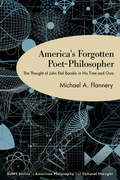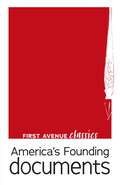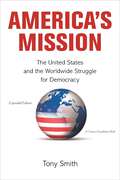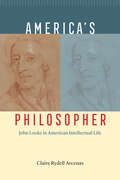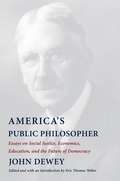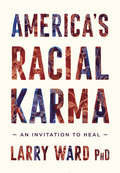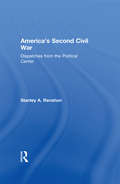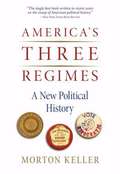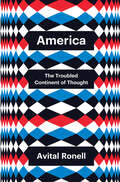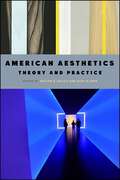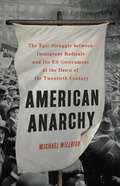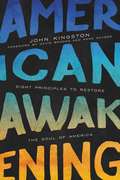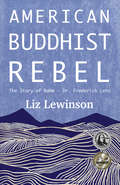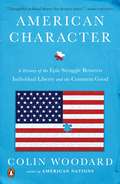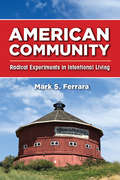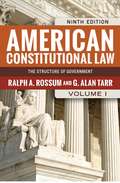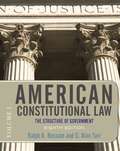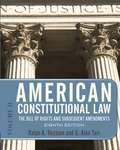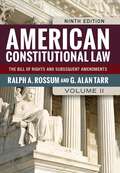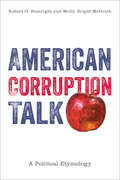- Table View
- List View
America's Forgotten Poet-Philosopher: The Thought of John Elof Boodin in His Time and Ours (SUNY series in American Philosophy and Cultural Thought)
by Michael A. FlanneryThis book examines the ideas and influences of a nearly forgotten Swedish-American philosopher, John Elof Boodin (1869–1950). A friend and student of William James and protégé of Josiah Royce at Harvard, Boodin combined Jamesian pragmatism and Roycean idealism in developing original scholarship (nearly sixty articles and eight books) from 1900 to 1947, in addition to a volume of posthumous papers published in 1957. Although he is seldom remembered today, the enduring importance of pragmatism and the rising influence of process theology today suggests that his close reading of early to mid-twentieth-century science and vast grasp of philosophical issues warrants a renewed interest in his work that can be a valuable antidote to the sterile and constricting effects of reductionism and dogmatic materialism prevalent today in both those fields.
America's Founding Documents: The Declaration of Independence, the Articles of Confederation, the United States Constitution, the Federalist Papers, and the Bill of Rights (First Avenue Classics ™)
by Alexander Hamilton James Madison John Jay Thomas JeffersonSoon after the start of the American Revolutionary War in 1775, the Thirteen Colonies proclaimed their independence from British rule and became the United States of America. The written word proved vital in shaping America's new identity, laying the groundwork for societal principles and political doctrine alike. From Thomas Jefferson and the members of the Second Continental Congress, to Alexander Hamilton, James Madison, and John Jay, the authors of these documents had a profound and lasting effect on United States history. This collection includes unabridged versions of five famous and influential documents that helped to found a nation: the Declaration of Independence (1776), the Articles of Confederation (1777), the United States Constitution (1787), the Federalist Papers (1787–1788), and the Bill of Rights (1791).
America's Mission: The United States and the Worldwide Struggle for Democracy - Expanded Edition (Princeton Studies in International History and Politics #139)
by Tony SmithAmerica's Mission argues that the global strength and prestige of democracy today are due in large part to America's impact on international affairs. Tony Smith documents the extraordinary history of how American foreign policy has been used to try to promote democracy worldwide, an effort that enjoyed its greatest triumphs in the occupations of Japan and Germany but suffered huge setbacks in Latin America, Vietnam, and elsewhere. With new chapters and a new introduction and epilogue, this expanded edition also traces U.S. attempts to spread democracy more recently, under presidents Clinton, Bush, and Obama, and assesses America's role in the Arab Spring.
America's Philosopher: John Locke in American Intellectual Life
by Claire Rydell ArcenasAmerica’s Philosopher examines how John Locke has been interpreted, reinterpreted, and misinterpreted over three centuries of American history. The influence of polymath philosopher John Locke (1632–1704) can still be found in a dizzying range of fields, as his writings touch on issues of identity, republicanism, and the nature of knowledge itself. Claire Rydell Arcenas’s new book tells the story of Americans’ longstanding yet ever-mutable obsession with this English thinker’s ideas, a saga whose most recent manifestations have found the so-called Father of Liberalism held up as a right-wing icon. The first book to detail Locke’s trans-Atlantic influence from the eighteenth century until today, America’s Philosopher shows how and why interpretations of his ideas have captivated Americans in ways few other philosophers—from any nation—ever have. As Arcenas makes clear, each generation has essentially remade Locke in its own image, taking inspiration and transmuting his ideas to suit the needs of the particular historical moment. Drawing from a host of vernacular sources to illuminate Locke’s often contradictory impact on American daily and intellectual life from before the Revolutionary War to the present, Arcenas delivers a pathbreaking work in the history of ideas.
America's Public Philosopher: Essays on Social Justice, Economics, Education, and the Future of Democracy
by John DeweyJohn Dewey was America’s greatest public philosopher. A prolific and influential writer for both scholarly and general audiences, he stands out for the remarkable breadth of his contributions. Dewey was a founder of a distinctly American philosophical tradition, pragmatism, and he spoke out widely on the most important questions of his day. He was a progressive thinker whose deep commitment to democracy led him to courageous stances on issues such as war, civil liberties, and racial, class, and gender inequalities.This book gathers the clearest and most powerful of Dewey’s public writings and shows how they continue to speak to the challenges we face today. An introductory essay and short introductions to each of the texts discuss the current relevance and significance of Dewey’s work and legacy. The book includes forty-six essays on topics such as democracy in the United States, political power, education, economic justice, science and society, and philosophy and culture. These essays inspire optimism for the possibility of a more humane public and political culture, in which citizens share in the pursuit of lifelong education through participation in democratic life. America’s Public Philosopher reveals John Dewey as a powerful example for scholars seeking to address a wider audience and a much-needed voice for all readers in search of intellectual and moral leadership.
America's Racial Karma: An Invitation to Heal
by Larry WardImmediate, illuminating, and hopeful: this is the key set of talks given by leading Zen Buddhist teacher Larry Ward, PhD, on breaking America's cycle of racial trauma."I am a drop in the ocean, but I'm also the ocean. I'm a drop in America, but I'm also America. Every pain, every confusion, every good and every bad and ugly of America is in me. And as I transform myself and heal and take care of myself, I'm very conscious that I'm healing and transforming and taking care of America. I say this for American cynics, but this is also true globally. It's for real." So says Zen Buddhist teacher Dr. Larry Ward.Shot at by the police as an 11-year-old child for playing baseball in the wrong spot, as an adult, Larry Ward experienced the trauma of having his home firebombed by racists. At Plum Village Monastery in France, the home in exile of his teacher, Vietnamese peace activist and Zen teacher Thich Nhat Hanh, Dr. Ward found a way to heal. In these short reflective essays, he offers his insights on the effects of racial constructs and answers the question: how do we free ourselves from our repeated cycles of anger, denial, bitterness, pain, fear, violence? Larry Ward looks at the causes and conditions that have led us to our current state and finds, hidden in the crisis, a profound opportunity to reinvent what it means to be a human being. This is an invitation to transform America's racial karma.
America's Second Civil War: Dispatches from the Political Center
by Stanley A. Renshon"America has always taken a coherent national identity for granted. In recent decades that assumption has been challanged. Individual and group rights have expanded, eliciting acerbic debate about the legitimacy and limits of claims. National political leaders have preferred to finesse rather engage these controversies. At the same time, large numbers of new immigrants have dramatically made the United States more racially, ethnically, and culturally diverse. As a result this country faces critical political and cultural questions. What does it mean to be an American? What, if anything, binds our country and citizens together? Is a ""new American identity"" developing, and if so, what is it? Can political leaders help us answer these questions?For the second time in the history of the United States another civil war looms. Tthe new danger lies in conflicts among people of different racial, cultural, and ethnic heritages, and between those who view themselves as culturally, politically, and economically disadvantaged versus those whom they see as privileged. Unlike the first Civil War, the antagonists cannot take refuge in their family or their religious, social, cultural or political organizations. These are the precisely the places were the war is being fought. At issue is whether it is possible or desirable to preserve the strengths of a common heritage. Some quarters insist that our past has resulted in a culture only worth tearing down to build over, rather than one worth keeping and building upon.We are in conflict over the viability of American culture and identity itself.This volume is organized into a series of intellectually grounded but provocative chapters on political leadership, the 2000 presidential campaign. Immigration, affirmative action, and other contemporary social and political issues. Renshon uses the perspective of political psychology to help us to see old issues in new ways, and new issues in different ways. His critical questi"
America's Three Regimes: A New Political History
by Morton KellerHailed in The New York Times Book Review as "the single best book written in recent years on the sweep of American political history," this groundbreaking work divides our nation's history into three "regimes," each of which lasts many, many decades, allowing us to appreciate as never before the slow steady evolution of American politics, government, and law. The three regimes, which mark longer periods of continuity than traditional eras reflect, are Deferential and Republican, from thecolonial period to the 1820s; Party and Democratic, from the 1830s to the 1930s; and Populist and Bureaucratic, from the 1930s to the present. Praised by The Economist as "a feast to enjoy" and by Foreign Affairs as "a masterful and fresh account of U. S. politics," here is a major contribution to the history of the United States - an entirely new way to look at our past, our present, and our future - packed with provocative and original observations about American public life.
America: The Troubled Continent of Thought (Theory Redux)
by Avital RonellWhat position does America occupy in the recent history of Western philosophy? At once the destination for a series of fantasies and the place from which a new relationship to thought originated, America incarnates a dark continent whose strangeness and singularity has driven thinkers outside of their own philosophical comfort zone – often forcing them to show anger, anxiety or desire towards what they considered a challenge or a threat. This book provides a mapping of this complex relationship between America and philosophy through a series of examples drawn from a wide range of authors, from Freud and Heidegger to Adorno, Derrida and many others. It also examines the way American thinkers themselves have imported, used and abused philosophical views coming from Europe, often transforming them into something other than what they were. Is then philosophy an anti-American discourse, or America an anti-philosophical country? Or is it, rather, that America provokes philosophy from a place where its own history affirms the impossibilities, paradoxes and contradictions of philosophy itself? At a time when the syntagm “America” has come to crystallize a certain understanding of the world order, interrogating the place that it occupies in our intellectual tradition is also a way to engage critically with the violence attached to it. “America” is a syntagm for violence, but this violence might very well be different than we thought.
American Aesthetics: Theory and Practice (SUNY series in American Philosophy and Cultural Thought)
by Walter B. Gulick; Gary SlaterAlthough there are distinctly American artists—Walt Whitman, Herman Melville, Grandma Moses, Thomas Hart Benton, and Andy Warhol, for example—very little attention has been devoted to formulating any distinctively American characteristics of aesthetic judgment and practice. This volume takes a step in this direction, presenting an introductory essay on the possibility of such a distinctly American tradition, and a collection of essays exploring particular examples from a variety of angles. Some of the essays in this collection extend pragmatist and process insights about the important place aesthetics has in molding and assessing experience. Other essays examine the place of American aesthetics in relation to such particular forms of art as painting, literature, music, and film. Three essays attend to the aesthetic aspects of a flourishing life. In each of the essays, American aesthetics is understood to arise out of deeply felt personal, historical, and cultural backgrounds. Consequently, not only are such relatively abstract notions as harmony, fit, elegance, proportion, and the like involved in aesthetic judgment, but also religious, political, and social factors become embroiled in aesthetic discernment. Thus the ongoing pattern of American aesthetics is shown to be distinguishable from such other varieties of aesthetic thought as analytic aesthetics, New Criticism, and postmodern approaches to aesthetics.
American Anarchy: The Epic Struggle between Immigrant Radicals and the US Government at the Dawn of the Twentieth Century
by Michael WillrichA "lively, fast-paced history" (Adam Hochschild, bestselling author of American Midnight) of America&’s anarchist movement and the government&’s tireless efforts to destroy it In the early twentieth century, anarchists like Emma Goldman and Alexander Berkman championed a radical vision of a world without states, laws, or private property. Militant and sometimes violent, anarchists were heroes to many working-class immigrants. But to many others, anarchism was a terrifyingly foreign ideology. Determined to crush it, government officials launched a decades-long &“war on anarchy,&” a brutal program of spying, censorship, and deportation that set the foundations of the modern surveillance state. The lawyers who came to the anarchists&’ defense advanced groundbreaking arguments for free speech and due process, inspiring the emergence of the civil liberties movement.American Anarchy tells the gripping tale of the anarchists, their allies, and their enemies, showing how their battles over freedom and power still shape our public life.
American Awakening: Eight Principles to Restore the Soul of America
by John KingstonA healthy and united America--perhaps a country more united than it has ever been--is truly possible, and it starts with us. John Kingston draws on wisdom from history, science, faith, and culture, along with his own experiences, to offer eight principles for discovering purpose, meaning, and true community. We live in the greatest peace and prosperity that the world has ever known, but Americans are feeling more division, isolation, depression, and despair than ever before. These are issues of the soul. We seem unable to find purpose and meaning. We can't find "the life that is truly life"--a vibrant and purpose-filled way of living best experienced together.From his youth, Kingston has always carried a vision for a free and united America. With an approachable and conversational style, as well as a dash of humor, Kingston draws on a diverse and compelling collection of wisdom--the parables of the Bible and the philosophy of Aristotle, the legacy of Nelson Mandela and the speeches of Abraham Lincoln, the songs of Bruce Springsteen and current studies from the best neuro and social scientists today--to remind us that there is no "them," there is only us, and we're in this together.In American Awakening, Kingston offers eight timeless principles for breaking through this darkness and despair and cultivating a radical togetherness, both here in this country and around the globe. You'll discover the profound impact of:In-person connectionMaking more from lessDiscovering purposeRedeeming adversityResponding instead of reactingFinding your unique sense of belongingWherever you find yourself politically or spiritually, a healthy and united America starts with you. Join the Awakening movement and let's rediscover who we are--together.
American Buddhist Rebel: The Story of Rama - Dr. Frederick Lenz
by Liz LewinsonWinner of the 2016 Eric Hoffer Award, this acclaimed biography of the brilliant, controversial Buddhist teacher Rama - Dr. Frederick Lenz (1950 - 1998) is this free-spirited adventure of a wild, sports jock teenager who transforms into an iconoclastic, innovative leader, boundary breaking is de rigueur as reported by the 100+ students and colleagues interviewed by author Liz Lewinson. Meditation, the empowerment of women and career as practice are but three of the core teachings covered in this book. Dr. Lenz ran into opposition, of course, but he kept his priorities straight. When he visited Nepal at age 19, he encountered an aged monk who informed him that he was a lineage bearer. He was to revive an ancient school of enlightenment. He was to find his many past life students and help them achieve joyous enlightenment in this life or at least set them securely on the path. He was to do this in the West, using Western means. In the East, centuries-old traditions maintain meditative pathways to enlightenment. In the West, facing a blank canvas, Dr. Lenz found new ways to build mental/meditative prowess through careers such as computer science, visits to American "places of power," knowledge about real gender equilibrium, movies, music, and dance. He taught these skills to American students and observed their success. When you read this fast-paced biography, you enter the inner teaching circle of baseline American Buddhism. "This fascinating biography captures the wisdom of a genuine, compelling teacher who combined absolute miracles with humor, fun, and adventure. When you read this fast-paced book, you feel you are there, learning and transforming. This is an original and exciting read." -- Lynn Andrews, author of The Medicine Woman Series
American Character: A History of the Epic Struggle Between Individual Liberty and the Common Good
by Colin WoodardThe author of American Nations examines the history of and solutions to the key American question: how best to reconcile individual liberty with the maintenance of a free society The struggle between individual rights and the good of the community as a whole has been the basis of nearly every major disagreement in our history, from the debates at the Constitutional Convention and in the run up to the Civil War to the fights surrounding the agendas of the Federalists, the Progressives, the New Dealers, the civil rights movement, and the Tea Party. In American Character, Colin Woodard traces these two key strands in American politics through the four centuries of the nation’s existence, from the first colonies through the Gilded Age, Great Depression and the present day, and he explores how different regions of the country have successfully or disastrously accommodated them. The independent streak found its most pernicious form in the antebellum South but was balanced in the Gilded Age by communitarian reform efforts; the New Deal was an example of a successful coalition between communitarian-minded Eastern elites and Southerners. Woodard argues that maintaining a liberal democracy, a society where mass human freedom is possible, requires finding a balance between protecting individual liberty and nurturing a free society. Going to either libertarian or collectivist extremes results in tyranny. But where does the “sweet spot” lie in the United States, a federation of disparate regional cultures that have always strongly disagreed on these issues? Woodard leads readers on a riveting and revealing journey through four centuries of struggle, experimentation, successes and failures to provide an answer. His historically informed and pragmatic suggestions on how to achieve this balance and break the nation’s political deadlock will be of interest to anyone who cares about the current American predicament—political, ideological, and sociological.From the Hardcover edition.
American Community: Radical Experiments in Intentional Living
by Mark S. FerraraMainstream notions of the “American Dream” usually revolve around the ownership of private property, a house of one’s own. Yet for the past 400 years, a large number of Americans have dared to dream bigger and bolder, choosing to live in intentional communities that pooled resources, and they worked to ensure the well-being of all their members. American Community takes us inside forty of the most interesting intentional communities in the nation’s history, from the colonial era to the present day. You will learn about such little-known experiments in cooperative living as the Icarian communities, which took the utopian ideas expounded in a 1840 French novel and put them into practice, ultimately spreading to five states over fifty years. Plus, it covers more recent communities such as Arizona’s Arcosanti, designed by architect Paolo Soleri as a model for ecologically sustainable living. In this provocative and engaging book, Mark Ferrara guides readers through an array of intentional communities that boldly challenged capitalist economic arrangements in order to attain ideals of harmony, equality, and social justice. By shining a light on these forgotten histories, it shows that far from being foreign concepts, communitarianism and socialism have always been vital parts of the American experience.
American Constitutional Law, Volume I
by Ralph A. Rossum G. Alan TarrThe study of the Constitution and constitutional law is of fundamental importance to understanding the principles, prospects, and problems of America. American Constitutional Law, Volume I provides a comprehensive account of the nation’s defining document, comparing how its provisions were originally understood by those who drafted and ratified it with contemporary constructions. The authors examine the constitutional thought of the founders, as well as interpretations of the Constitution by the Supreme Court, Congress, the President, lower federal courts, and state judiciaries to provide students with a sense of how the law has been interpreted over the years. Now fully updated, the ninth edition of this classic volume features several new cases including National Federation of Independent Business v. Sebelius, Arizona v. United States, and Caperton v. A. T. Massey Coal Company Visit westviewconlaw. com for instructor resources, including recently decided cases, material from prior editions, and a glossary.
American Constitutional Law, Volume I
by Ralph A. Rossum G. Alan TarrAmerican Constitutional Law provides a comprehensive account of the nation’s defining document. Based on the premise that the study of the Constitution and constitutional law is of fundamental importance to understanding the principles, prospects, and problems of America, this text puts current events in terms of what those who initially drafted and ratified the Constitution sought to accomplish. The authors examine the constitutional thought of the founders, as well as interpretations of the Constitution by the Supreme Court, Congress, the President, lower federal courts, and state judiciaries. Now fully updated, the eighth edition of this classic volume focuses on federal rights and powers and incorporates six new cases, including Boumediene v. Bush, Medellin v. Texas, Hein v. Freedom from Religion Foundation, and Plains Commerce Bank v. Long Family Land and Cattle Company. Also available in its eighth edition from authors Ralph A. Rossum and G. Alan Tarr: American Constitutional Law, Volume II: The Bill of Rights and Subsequent Amendments (Westview Press, ISBN 978-0-8133-4478-2).
American Constitutional Law, Volume I: The Structure of Government
by Ralph A. Rossum G. Alan TarrA comprehensive core textbook and casebook that emphasizes precedent setting cases and alternative constitutional positions for courses in constitutional law and civil liberties.
American Constitutional Law, Volume II
by Ralph A. Rossum G. Alan TarrEnhance your understanding of the nation ‚'s defining document with AMERICAN CONSTITUTIONAL LAW: THE BILL OF RIGHTS AND SUBSEQUENT AMENDMENTS, VOLUME II! With a focus on individuals ‚' rights and responsibilities, this political science text provides you with the information you need to understand the principles, prospects, and problems of America. Chapter and case introductions frame the development of the law and help you understand both the material and its context. Precedent-setting cases in areas such as privacy, criminal procedure, and abortion rights are included in the text and you can use the companion website to read additional cases of historical significance and current cases as they are decided.
American Constitutional Law, Volume II
by Ralph A. Rossum G. Alan TarrThe study of the Constitution and constitutional law is of fundamental importance to understanding the principles, prospects, and problems of America. American Constitutional Law, Volume II, provides a comprehensive account of the nation's defining document, comparing how its provisions were originally understood by those who drafted and ratified it with contemporary constructions. The authors examine the constitutional thought of the founders, as well as interpretations of the Constitution by the Supreme Court, Congress, the President, lower federal courts, and state judiciaries to provide students with a sense of how the law has been interpreted over the years. Now fully updated, the ninth edition of this classic volume features eleven new cases including Caperton v. A. T. Massey Coal Company, Citizens United v. Federal Election Commission, Perry v. Brown, Snyder v. Phelps, and Holder v. Humanitarian Law Project. Visit www.westviewconlaw.com for additional resources, including recently decided cases, material from prior editions, and a glossary.
American Constitutional Law, Volume II
by Ralph A. Rossum G. Alan TarrThe study of the Constitution and constitutional law is of fundamental importance to understanding the principles, prospects, and problems of America. American Constitutional Law, Volume II provides a comprehensive account of the nation’s defining document, comparing how its provisions were originally understood by those who drafted and ratified it with contemporary constructions. The authors examine the constitutional thought of the founders, as well as interpretations of the Constitution by the Supreme Court, Congress, the President, lower federal courts, and state judiciaries to provide students with a sense of how the law has been interpreted over the years. Now fully updated, the ninth edition of this classic volume features several new cases including Caperton v. A. T. Massey Coal Company, Citizens United v. Federal Election Commission, Perry v. Brown, Snyder v. Phelps, and Holder v. Humanitarian Law Project. Visit westviewconlaw. com for instructor resources, including recently decided cases, material from prior editions, and a glossary.
American Constitutional Law, Volume II
by Ralph A. Rossum G. Alan TarrAmerican Constitutional Law provides a comprehensive account of the nation’s defining document. Based on the premise that the study of the Constitution and constitutional law is of fundamental importance to understanding the principles, prospects, and problems of America, this text puts current events in terms of what those who initially drafted and ratified the Constitution sought to accomplish. The authors examine the constitutional thought of the founders, as well as interpretations of the Constitution by the Supreme Court, Congress, the President, lower federal courts, and state judiciaries. Now fully updated, the eighth edition of this classic volume focuses on individuals’ rights and responsibilities and incorporates nine new cases, including District of Columbia v. Heller, In re Marriage Cases, Kennedy v. Louisiana, and Parents Involved in Community Schools v. Seattle School District No. 1. Also available in its eighth edition from authors Ralph A. Rossum and G. Alan Tarr: American Constitutional Law, Volume I: The Structure of Government (Westview Press, ISBN 978-0-8133-4477-5).
American Constitutional Law: Volume 1, The Structure of Government
by Ralph A. Rossum G. Alan TarrAmerican Constitutional Law provides a comprehensive account of the nation's defining document. Based on the premise that the study of the Constitution and constitutional law is of fundamental importance to understanding the principles, prospects, and problems of America, this text puts current events in terms of what those who initially drafted and ratified the Constitution sought to accomplish. The authors examine the constitutional thought of the founders, as well as interpretations of the Constitution by the Supreme Court, Congress, the President, lower federal courts, and state judiciaries. Now fully updated, the eighth edition of this classic volume focuses on federal rights and powers and incorporates six new cases, including Boumediene v. Bush, Medellin v. Texas, Hein v. Freedom from Religion Foundation, and Plains Commerce Bank v. Long Family Land and Cattle Company.Also available in its eighth edition from authors Ralph A. Rossum and G. Alan Tarr: American Constitutional Law, Volume II: The Bill of Rights and Subsequent Amendments (Westview Press, ISBN 978-0-8133-4478-2).
American Constitutional Law: Volume 2, The Bill of Rights and Subsequent Amendments
by Ralph A. Rossum G. Alan TarrAmerican Constitutional Law provides a comprehensive account of the nation's defining document. Based on the premise that the study of the Constitution and constitutional law is of fundamental importance to understanding the principles, prospects, and problems of America, this text puts current events in terms of what those who initially drafted and ratified the Constitution sought to accomplish. The authors examine the constitutional thought of the founders, as well as interpretations of the Constitution by the Supreme Court, Congress, the President, lower federal courts, and state judiciaries. Now fully updated, the eighth edition of this classic volume focuses on individuals' rights and responsibilities and incorporates nine new cases, including District of Columbia v. Heller, In re Marriage Cases, Kennedy v. Louisiana, and Parents Involved in Community Schools v. Seattle School District No. 1.Also available in its eighth edition from authors Ralph A. Rossum and G. Alan Tarr: American Constitutional Law, Volume I: The Structure of Government (Westview Press, ISBN 978-0-8133-4477-5).
American Corruption Talk: A Political Etymology
by Robert G. Boatright Molly Brigid McGrathAmericans often worry about political corruption—not only about specific officials misusing their powers, but also more broadly about political, cultural, moral decay or deterioration. Underneath our talk about corruption lie deeper claims and concerns about how we organize our common life. American Corruption Talk presents a study of corruption and corruption talk that seeks to understand those deeper claims and concerns. Robert Boatright and Molly Brigid McGrath focus on the role corruption talk plays in American political discourse. They distinguish between two ways people speak about corruption—corruption talk in the style of a purifier, who wishes to expunge the evil forces or drain the swamp, and corruption talk in the style of the mender, who thinks of managing, replacing, or repairing. American Corruption Talk begins by tracing how the concept of political corruption was developed by philosophers and political thinkers, leading up to its use in the American context, especially in the Progressive Era. It also compares modes of contemporary corruption talk in different areas of public life. In doing so, the authors hope to resolve confusion and partisan disagreements about what corruption is and to discourage the tendency to label actions, events, and ideas that we merely disagree with as corrupt.
